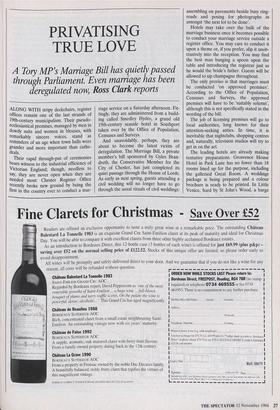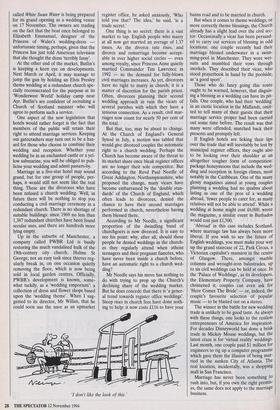PRIVATISING TRUE LOVE
A Tory MP's Marriage Bill has quietly passed through Parliament. Even marriage has been
ALONG WITH stripy deckchairs, register offices remain one of the last strands of 19th-century municipalism. Their pseudo- ecclesiastical premises, managed by men in dowdy suits and women in blouses, with remarkably sincere voices, stand as reminders of an age when town halls were grander and more important than cathe- drals.
Their rapid through-put of ceremonies bears witness to the industrial efficiency of Victorian England; though, needless to say, they are never open when they are needed most: Chester Register Office recently broke new ground by being the first in the country ever to conduct a mar- riage service on a Saturday afternoon. Fit- tingly, they are administered from a build- ing called Smedley Hydro, a grand old 19th-century seaside hotel in Southport taken over by the Office of Population, Censuses and Surveys.
And unavoidably, perhaps, they are about to become the latest victim of deregulation. The Marriage Bill, a private member's bill sponsored by Gyles Bran- dreth, the Conservative Member for the City of Chester, has just completed its quiet passage through the House of Lords. As early as next spring, guests attending a civil wedding will no longer have to go through the usual rituals of civil weddings: assembling on pavements beside busy ring- roads and posing for photographs in amongst 'the next lot to be done'.
Hotels may take over the bulk of the marriage business once it becomes possible to conduct your marriage service outside a register office. You may care to conduct it upon a theme or, if you prefer, slip it unob- trusively into the reception. You may find the best man banging a spoon upon the table and introducing the registrar just as he would the bride's father. Guests will be allowed to sip champagne throughout.
The only proviso is that marriages must be conducted 'on approved premises'. According to the Office of Population, Censuses and Surveys, the approved premises will have to be 'suitably solemn', although this is not specifically stated in the wording of the bill.
The job of licensing premises will go to local authorities, long known for their attention-seeking antics. In time, it is inevitable that nightclubs, shopping centres and, naturally, television studios will try to get in on the act.
The leading hotels are already making tentative preparations. Grosvenor House Hotel in Park Lane has no fewer than 18 rooms lined up for the purpose, including the galleried Great Room. A weddings package is being prepared and a colour brochure is ready to be printed. In Little Venice, hard by St John's Wood, a barge called White Swan Water is being prepared for its grand opening as a wedding venue on 17 November. The owners are trading on the fact that the boat once belonged to Elizabeth Emmanuel, designer of the Princess of Wales's wedding-dress unfortunate timing, perhaps, given that the Princess has just told American television that she thought the dress 'terribly fussy'.
At the other end of the market, Butlin's is keeping a keen eye on developments. Next March or April, it may manage to jump the gun by holding an Elvis Presley theme wedding at a redundant church spe- cially reconsecrated for the purpose at its `Wonderwest World' holiday camp near Ayr. Butlin's are confident of recruiting a Church of Scotland minister who will agree to perform such a service.
One aspect of the new legislation that hotels would rather forget is the fact that members of the public will retain their right to attend marriage services. Keeping out gatecrashers may turn out to be a haz- ard for those who choose to combine their wedding and reception. Whether your wedding be in an enchanted castle or a yel- low submarine, you will be obliged to pub- licise your wedding and admit passers-by.
Marriage in a five-star hotel may sound grand, but for one group of people, per- haps, it would still not seem like the real thing. These are the divorcees who have been refused a church wedding. Well, in future there will be nothing to stop you conducting a civil marriage ceremony in a redundant church. There is no shortage of suitable buildings: since 1969 no less than 1,387 redundant churches have been found secular uses, and there are hundreds more lying empty.
Up in the suburbs of Manchester, a company called PWBR Ltd is busily restoring the much vandalised hulk of the 19th-century city church, Hulme St George; not an easy task since thieves reg- ularly break in, on one occasion quietly removing the floor, which is now being sold in local garden centres. Officially, PWBR's development is known, some- what tackily, as a 'wedding emporium': a collection of dress and flower shops based upon the 'wedding theme'. When I sug- gested to its director, Mr Willan, that he could soon use the nave as an upmarket register office, he asked anxiously, 'Who told you that? The idea,' he said, 'is a trade secret.'
One thing is no secret: there is a vast market to tap. English people who marry at all now get married an average of 1.37 times. As the divorce rate rises, and divorce and remarriage become accept- able in ever higher social circles — even among royalty, since Princess Anne quietly married Commander Tim Lawrence in 1992 — so the demand for fully-blown civil marriages increases. As yet, divorcees have no right to marry in church; it is a matter of discretion for the parish priest. Often, divorcees planning their second wedding approach in vain the vicars of several parishes with which they have a tenuous connection. As a result, civil mar- riages now count for nearly 50 per cent of the total.
But that, too, may be about to change. At the Church of England's General Synod in July, a motion was tabled that would give divorced couples the automatic right to a church wedding. Perhaps the Church has become aware of the threat to its market share once bleak register offices are no longer their sole competitor. But according to the Revd Paul Needle of Great Addington, Northamptonshire, who proposed the change, many vicars have become embarrassed by the 'double stan- dards' of the Church of England, which often leads to divorcees, denied the chance to have their second marriages performed in church, nevertheless having them blessed there.
According to Mr Needle, a significant proportion of the dwindling band of churchgoers is now divorced. It is easy to see his point: why, after all, should these people be denied weddings in the church- es they regularly attend when atheist teenagers and their pregnant fiancees, who have never been inside a church before, have an automatic right to a church wed- ding?
Mr Needle says his move has nothing to do with trying to prop up the Church's declining share of the wedding market. But he does concede that there is 'a gener- al trend towards register office weddings'. Steep rises in church fees have done noth- ing to help: it now costs £116 to have your 'I don't like the look of this.' banns read and to be married in church.
But when it comes to theme weddings, or more correctly theme blessings, the Church already has a slight lead over the civil sec- tor. Occasionally a vicar has been persuad- ed to carry out services of blessing in odd locations: one couple recently had their marriage blessed underwater in a swim- ming-pool in Manchester. They wore wet- suits and mumbled their vows through snorkels. They described their vicar, who stood prayerbook in hand by the poolside, as 'a good sport'.
Those who do fancy going this route ought to be warned, however, that disguis- ing a blessing as a wedding can have its pit- falls. One couple, who had their 'wedding' in an exotic location in the Midlands, omit- ted to tell many of their guests that their marriage service proper had been carried out some time before. The result was that many were offended, snatched back their presents and promptly left.
If English hotels are licking their lips over the trade that will inevitably be lost by municipal register offices, they ought also to be looking over their shoulder at an altogether tougher form of competition: package honeymoons that include the wed- ding and reception in foreign climes, most notably in the Caribbean. One of the many glossy magazines aimed at young couples planning a wedding had no qualms about listing as one of the pros of a wedding abroad, 'fewer people to cater for, as many relatives will not be able to attend'. While a wedding at home might cost £6,000, wrote the magazine, a similar event in Barbados would cost just £1,500.
`Abroad' in this case includes Scotland, where marriage law has always been more liberal. If you wish to see the future of English weddings, you must make your way up the grand staircase of 22, Park Circus, a Victorian capitalist's mansion in the centre of Glasgow. There, amongst marble columns and wrought-iron balustrades, up to six civil weddings can be held at once. In the 'Palace of Weddings', as its developers, the Elementary Property Company, have christened it, couples can even ask for `Here Comes The Bride' — or, indeed, the couple's favourite selection of popular music — to be blasted out on a stereo.
The winner in the battle for new wedding trade is unlikely to be good taste. As always with these things, one looks to the restless entrepreneurs of America for inspiration. For decades Disneyworld has done a brisk trade in Mickey Mouse weddings, but the latest craze is for 'virtual reality' weddings. Last month, one couple paid $1 million for engineers to rig up a computer programme which gave them the illusion of being mar- ried in the sunken City of Atlantis. The real location, incidentally, was a shopping mall in San Francisco.
Marriage has never been something to rush into, but, if you own the right premis- es, the same does not apply to the marriage business.



































































 Previous page
Previous page